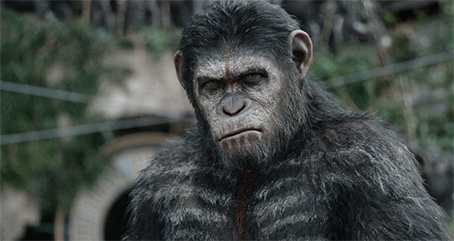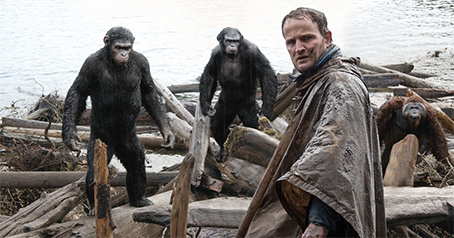| |
"I said that this movie should begin with Caesar and it should begin in the woods. It should be like the beginning of 2001: A Space Odyssey and be dawn of intelligent apes instead of dawn of man.” |
|
Director, Matt Reeves |
| |
"Evolution was far more thrilling to me than the biblical account. Who would not rather be a rising ape than a falling angel? To my juvenile eyes, Darwin was proved true every day. It doesn't take much to make us flip back into monkeys again." |
|
Author, Terry Pratchett |
No, it doesn't. But we'll come back to that aspect at the close of my piece. This review will be something of a tease. There are many things about this film that are more than noteworthy, many aspects of its production that invite no little awe at such a blinding technical accomplishment. As ever, at Outsider, we may nod at the tech (the necessity of which is for the promulgation of the 'spectacular narrative' which must appeal to a worldwide audience) but what we really care about is caring: caring about character and narrative: upsetting and confounding expectations and a taking a stand pushing a modest rebellion against the corporate assumption of the term 'demographic'. With that in mind, let's swing to the nearest, strongest branch...
I once picked a fight with an orangutan. No, really. I was working on a film starring Terrence Stamp and Elisabeth Shue, two chimpanzees and an orangutan. Training the apes was Ray Berwick (he trained the birds for Hitchcock's Psycho... That was easy. They were all stuffed). I'm not lying about the fact Berwick was the animal trainer for movies. I was watching a scene play out and Locke (the orangutan dyed black to look like a very old and idiosyncratic chimpanzee) stared right at me and clicked his teeth together. Amused, I did likewise. I was thrilled when he did it right back. I wasn't so thrilled when Ray's assistant pulled me out of my chair to a safer distance informing me that I'd just agreed to take Locke on, mano-a-orano. Respect for these animals is something I had before I worked with them but seeing a baby chimp loose in Scotland pounding on the back of a third assistant director trying to keep a tray full of coffees upright remains the most hysterical but scary image I remember personally witnessing. As I alluded to in my review for Rise, I even shot a documentary about chimps and spent a lot of time observing them and interacting. A young chimp sits on your arm and you know about it; their musculature is dense and they are surprisingly heavy. Research tells me you don't want to spend too much time socialising with a fully-grown adult. Their strength is many times greater than ours. And when they are pissed off, they don't hit malfunctioning cars with tree branches, they rip your arm off. So, while not in the Goodall-ian league of expertise, I am acquainted with our furry cousins.

So, trying not to be too dismissive in tone, here's the story. Very few humans remain after the dissemination of the global plague nicknamed 'simian flu' despite apes having nothing to do with the virus's creation. Enclaves of genetically immune humans live scattered existences but they are without practical power and things they once took for granted. Seeking the means to generate light via electricity, our northern Californian group come into contact with Caesar and his village of apes all living happily amongst the over-designed Ikea-Habitat decorated redwoods. OK. So the first thing a human does upon meeting his fellow primate? He shoots a chimp. Not a good start. The apes live near an abandoned hydroelectric dam that the humans want to restart. We establish bastard-apes and bastard-humans, good-apes and good-humans. All by the book, standard Hollywood fare. And what in the seven levels of quality filmmaking is Gary Oldman doing here? Oh, it's quality for sure (and yes, actors sometimes take jobs so their children can see what their parents actually do for a living when it's not an 'R' or 'X' rated movie). But he's the leader of the humans that we are expected to believe acts selflessly enough to make a great sacrifice. The part's not written well enough for us to actually believe he would act this way. Ex-Fringe actor, Kirk Acevedo, plays one of the human-bastards, the suitably "Oh, so going to die," evil Carver. Despite the clumsily crow-barred in justification for needing him at all – "He's the only man who know the tech..." bullshit – he's the idiotic and stupefyingly dumb-ass moron who is the catalyst for war. His ape counterpart, Koba, is running along the same psychotic and species-ist line. Both want the end to the other – so far so foreseeable. Subsequently and unfortunately, things do not derail the Predictable Express...
I said of the franchise's first movie, "I salute a genuinely touching, exciting and thought provoking summer movie." I meant it and still do. Let's celebrate what the first two films in the rebooted Apes franchise share. Well, the producers are never going to say goodbye to the Serkis... The actor's dedication to his high tech craft is total and his performance very seductive. If it weren't for the avalanche of "Aren't we just effing great?" publicity, I would find it difficult to understand how the visual effects artists had pulled off these enormously affecting performances. But that's where the commonalities end – Serkis as Caesar. Dawn's script complicates matters by having a lot of the action take place in the rain (animal fur in rain... were the effects team after yet another challenge?) Yes, there is a degree of becoming comfortable with the astounding feats of digital characterisation so you can just enjoy the narrative but here's where it gets a bit tricky. The great feat of the movie (its tech) is the one thing you must forget to enjoy the thinnest and most perfunctory of war stories.
The cinematography (one assumes completed with a huge post-production effort given that very few shots in the film are bereft of complex digital effects) is at best, murky*. There's a great deal of muted, low level light mushiness that doesn't make actually watching the film as satisfying as it may have been. The filmmakers try and mostly succeed in enabling us to recognise the individual apes (beyond the leads, we're a bit aped out). Caesar has a striped-war-painted chest, his son is scarred of face and body and principal ape antagonist, Koba, wears a permanent snarl. Even Caesar's mate wears little hair ties on her forehead so we won't get her mixed up with any of the other generic chimps hanging around in the background. There is an unnaturally gigantic orangutan (why?), a few worthy gorilla guards and a few sympathetic Caesar supporters who almost have enough difference in their physicality to make them stand out. But despite this, all chimps are the same colour and from this, veteran cinematographer Michael Seresin has produced a muted splodge, a colour palette of dark greys and muted greens (hey, it's post apocalyptic, let's cut him some slack) but even viewing the trailer I got a "Oh..." feeling from the offered visuals, something that should have been a "Wow." The score, by Michael Giacchino, is simply not allowed to make any impression despite its quality – wherefore art thou, character themes? – and his contribution only seems able to be appreciated bereft of the movie's final mix where the emotion seems to be intact (orchestration-wise, it's very reminiscent of his work on Super 8 but that's OK).

The new Apes movies' trajectory has a passing resemblance to the waning of NASA's budget. Stay with me. In 1969, we landed on the moon. NASA could have asked for (and probably did) billions more to carry on the largely US domination of space. No doubt the filmmakers got a bigger budget for the sequel to the hugely successful and dramatically satisfying Rise. What happened to NASA? It landed more men on the moon and apart from the blip of death defying drama that was Apollo 13, the public soon lost interest and the later moon landings were met with an indifferent "Yeah, been, there, done that..." as opposed to the first reactions that were right for the truly awesome event when it was first achieved. Dawn suffers in the same way. We've seen the tech work really well in Rise. Now, it's more of the same but it isn't and that's even more damning. At the risk of reducing what is turning out to be a massive global hit into a by-the-numbers paint book of a movie, let me make one more point.
If you see, like or dislike Dawn of the Planet of the Apes, I have one question for you. How different would the movie have been (and how much more inexpensive!) if the apes had been a previously unknown human tribe (the Fukawee clan?) living deep in the forest out of contact with the modern world? In short, if Dawn had not been part of a franchise which depended on talking chimps as its raison d'être, and was in fact a medium budget movie called We're The Fukawee**, about a once civilised society in conflict with native people at one with nature, what would be the difference in the two movies? I regret to conclude, there would be absolutely no difference whatsoever. The apes are just furry people and therefore have no need to be apes at all. There is not a single moment in the film when you feel the apes need to be apes for it to be dramatically valid. A chance lost... Not sure what I would have done to make the apes more 'other' but then we are all animals... The second Dawn is clearly paving the way for the third Battle but I won't be in line when that time comes no matter what extraordinary tech is on offer. In Rise, Caesar was the star and as an ape, he had a reason to be the focus of the story. Now, ten years of evolution have turned him into a primitive man dealing with the range of moral fluctuation that earmarks the human and ape species. And at that level, the story is just so dull. Maybe the filmmakers think that all it takes to snare an audience is the revelation of jaw-dropping tech. I will sadly admit, they may be right...
*My misgivings over the muted palette of the cinematography may be exacerbated by the screening I attended in which the 1.85:1 aspect ratio was presented on a 2.35:1 screen with 2nd line of subtitles being chopped off and heads awkwardly cut off at the top of frame. A phone call to one of the cinema management resulted in an admission that "We just get the drives and slot them in..." I'm with Kermode on this. Projection is becoming a lost art. It makes me fume to think I didn't see the movie as shot.
**Take a look at the tracks listed on the soundtrack album. There are terrible puns on there that even I wouldn’t come up with! Check this lot out. And what's annoying is that I haven't got a title for this review yet. Curses. My options are dwindling.
01. Level Plaguing Field
02. Look Who's Stalking
03. The Great Ape Processional
04. Past Their Primates
05. Close Encounters Of The Furred Kind
06. Monkey To The City
07. The Lost City Of Chimpanzee
08. Along Simian Lines
09. Caesar No Evil, Hear No Evil
10. Monkey See, Monkey Coup
11. Gorilla Warfare
12. The Apes Of Wrath
13. Gibbon Take
14. Aped Crusaders
15. How Bonobo Can You Go
16. Enough Monkeying Around
17. Primates For Life
18. Planet Of The End Credits
19. Ain't That A Stinger
|